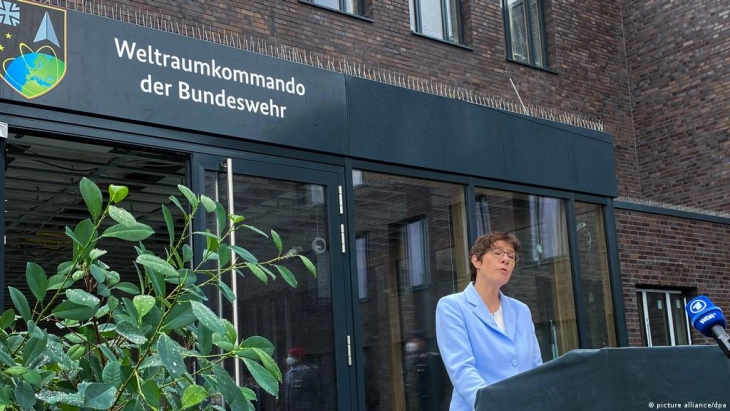Bundeswehr starts a space command for ‘defensive operations’
- Post By Ivan Kolekevski
- 19:45, 13 July, 2021

Berlin, 13 July 2021 (dpa/MIA) – German Defence Minister Annegret Kramp-Karrenbauer commissioned a Bundeswehr space command on Tuesday.
The body is to be responsible for protecting and monitoring satellites, observing dangerous space debris and analysing activities of other states in military reconnaissance.
The move makes protecting infrastructure such as satellites for communications, weather and navigation into a military task.
The term “space command” might evoke associations with Starship Enterprise but the reality is less exotic, Kramp-Karrenbauer said.
As a highly industrialized and fully networked knowledge society, Germany relies on information, alongside production and exports.
She said the nation had long relied on civilian and military satellites, making their security a vital issue.
The Bundeswehr has six satellites of its own in low-Earth orbits, she said.
“For Germany, space operations are always defensive operations,” Kramp-Karrenbauer said, adding this meant protecting key infrastructure or providing electromagnetic protection.
The new Space Command sees Air Force capabilities combined with the assets of the CIR cyberforce and Geoinformation Service. It is to operate from the air operations centre (ZLO) site in Uedem, in North Rhine Westphalia.
Germany’s military and civilian authorities use radar facilities such as German Experimental Space Surveillance and Tracking Radar (GESTRA), developed by the Fraunhofer Institute for High Frequency Physics and Radar Techniques (FHR), to focus on part of the sky, identify objects and make their trajectories predictable. The aim is to broaden its scope.
“Many communications applications, digital payments and positioning and navigation for private and commercial use would be unthinkable without the use of space,” the Bundeswehr said last year.
Space systems are part of the critical infrastructure that the government wants to protect.
Other areas of monitoring include what other nations and commercial actors are doing, as well as identifying potential threats such as dangerous manoeuvres, sabotage or space debris.







